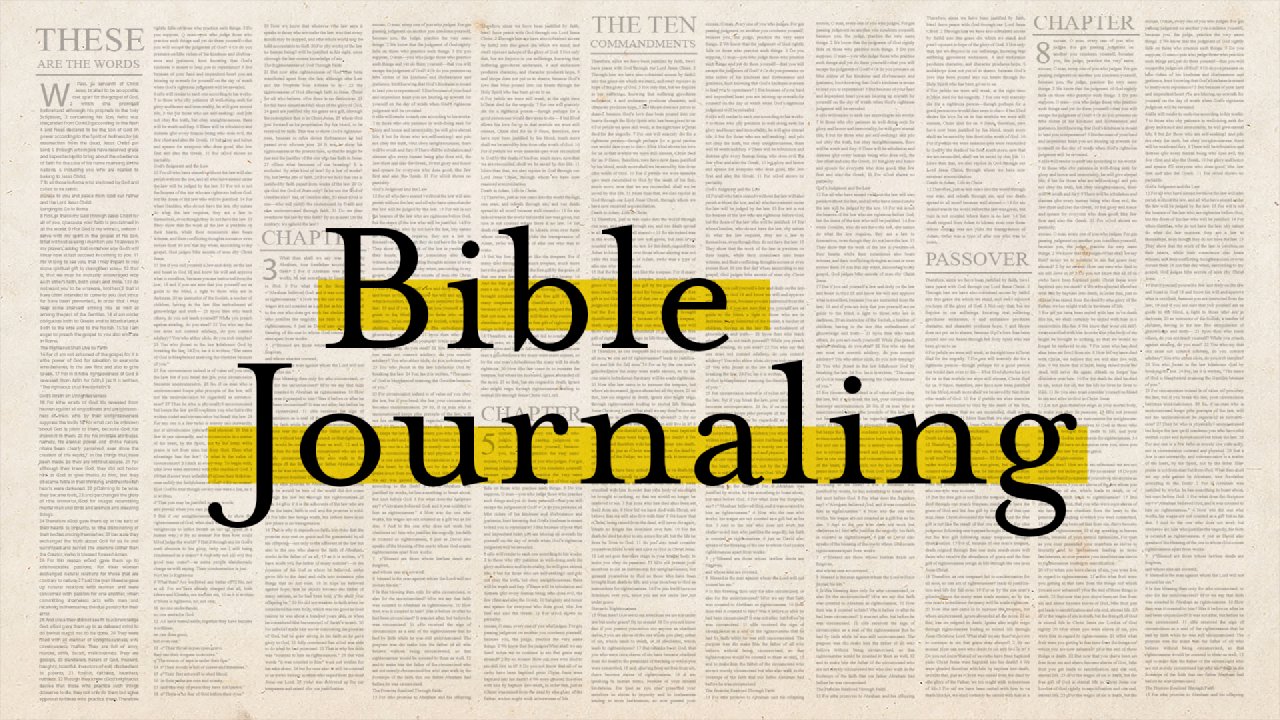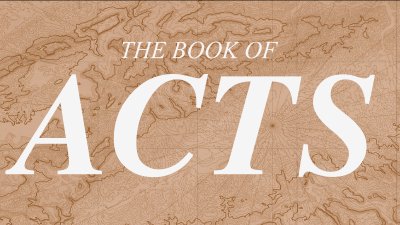Acts 2
November 12, 2023 • R. Scott Jarrett • Acts 2
1. The Christian Pentecost should be viewed as Sinai 2.0. given:
1) the sacred holiday of Pentecost (Shavout - Feast of Weeks, Exo 34:22) represented not only a celebration of God’s bountiful giving of physical food (or harvest), but also spiritual food since according to Jewish tradition, Pentecost was the day Israel received the Law from God at Sinai (Hag Matan Torateinu – The Festival of the Giving of Torah[1]) (1, “Pentecost…they were all together in one place”[2]).
2) the parallels that exist between Sinai and the Christian Pentecost:
(Exo 19:16-18 w/20:1, 18) = Fire and awe (“fire…people trembled”) accompanying the presence of God speaking about His mighty deeds and Law (“God spoke all these words, saying, ‘I am the LORD your God Who brought you out of the land of Egypt, out of the house of slavery’”) which all the people experienced/heard (“All the people perceived”).
(Act 2:2-12) = Fire and awe (“fire…They were amazed and astonished…they all continued in amazement and great perplexity”) accompanying the presence of God (“the Holy Spirit”) speaking about His mighty deeds and Law (“speaking of the mighty deeds of God”) which all the people experienced/heard (vv5-11).[3]
3) like the Christian Pentecost, Sinai also shares the association of people receiving the Spirit (Act 2:4 and Num 11:16-17 [this event takes place immediately following the Sinai event – Num 10:11-13]).
4) Luke’s mention of the Pentecost event as “fulfillment” (1, “When the day of Pentecost had come”) = Literally, “in complete fulfillment of the day of Pentecost” (Grk., en ho hemera pentakostay sumplay-ra-oe = In sum/complete fulfillment). Luke seems to be indicating that something started in the past (i.e., Sinai) has now come to completion (at Pentecost).[4]
5) What follows the Christian Pentecost is the receiving of the “new” Law (the Law as transformed in application and/or semantic range by Jesus) (42, “the apostles’ teaching”).
2. The “other tongues” – or tongues given by the Spirit to the early church, were human languages unknown to their speakers (versus a non-human language unknown to the speakers – e.g., an angelic language [Pentecostal version of speaking in tongues]) [5] (4-6, “tongues” [Grk., glossa = human language, Rev 14:6], “hearing them speak in his own language” – See also again, vv8-11)[6].
3. Without the proper biblical framework, acts of God (or obedience to God) have been known to be misinterpreted as the behavior of fools or false teachers (12-13; “full of sweet wine”) = Drunk early in the morning, the behavior of fools (14-15). Drunkenness during the day was also associated w/many pagan religions who believed alcohol (or the creation of ecstatic states) was a means to connecting w/deity (e.g., early Christians were accused of being cannibals [for eating their Lord] and guilty of incest [bc they married their brothers and sisters]; we are accused of being works based/trying to earn our salvation or unaware of what Scripture teaches about salvation by faith [bc we teach salvation also requires obedience]).
4. Prophesy always involves the miraculous but not always new words – or predictions about the future (16-18, “prophesy”) = Peter is identifying their miraculous speech as the fulfillment of the first portion of Joel 2:28-32 (i.e., the portion re: to prophecy). Yet the content of their speech was itself not miraculous. Once more, they were “speaking (only) of the mighty deeds of God” – referring to those deeds done by God in the past. How then does this qualify as prophecy? The content of most prophecy is not miraculous; it neither speaks about anything new nor predicts anything still future. For speech to qualify as prophetic only two things are necessary: 1) speech in agreement w/God’s existing words (Deu 13:1-11, 18:20), 2) speech accompanied by something miraculous (2Co 12:12; Deu 13:1-2, 18:21-22)—which in the early church’s case, was the ability to speak the various foreign languages of those present at Pentecost w/o knowing them beforehand.
5. Peter’s divinely inspired interpretation of Joel 2:28 as “And it shall be in the last days (versus how it was communicated in the original text, “And it shall come about after this”):
1) indicates that the Christian Pentecost/IPO of the indwelling Spirit is not only the beginning of new words/NT canon from God but also the final millennia before Christ’s return and Judgment Day (17-18 = Gifts of the Spirit necessary to new words from God [“prophesy…visions…dreams” = The indication of new words from God/NT canon], 19-20 = Signs that will immediately precede Jesus’ return [Mat 24:29-31]).
2) provides further evidence that Jesus’ return will be in the very near future (17, “last days” = Plural or referring to more than one day which in Jewish tradition, each day represents a thousand years of redemptive history [2Pe 3:8] and Messiah returns on the last day, the Sabbath [or at the end of 6,000 years].
At the time of Jesus’ earthly ministry, we were already somewhere in the range of 4,000 years – which means the “days” (or millennia) being referred to by Peter can be no more than two. That puts Jesus’ return somewhere around 2033 [or two thousand years after the Christian Pentecost which took place in 33 A.D.]. In this light, consider Jesus’ words in Joh 9:4).
3) should create greater urgency (in us) to be faithful and productive for His kingdom (Mat 25:14-30) – most especially in witnessing to the truth and saving others (Peter’s [Joel’s] point in v21. Once we reach the last days, there is no time to waste; again Joh 9:4, also Pro 11:30).
6. The indwelling (or empowering of the) Spirit is given for the purpose of:
1) witness in persecution (Chapter one: witnesses on fire in the fire) (1:8).
2) new Scripture (2:17, again, “prophesy…visions…dreams”).
3) judgment (most esp. in the covenant community – 18, “prophesy” [all God’s people] = Judgment is a form of prophecy [e.g., Eze 23:36]; The NC indwelling Spirit is the new version of Num 11:17, hence Mat 18:15 = Every member judging/holding other members accountable/responsible for preserving justice/confronting sin as the first step in congregational justice/discipline).
7. What God wants the Jews to know about Jesus:
1) He was from God (22; Joh 3:2).
2) God’s plan was to deliver Him to the Jews as the (truly) propitiatory sacrifice for their sins (23a; The animal sacrifices were neither sufficient nor penal [i.e., the lambs were not punished]– Rom 3:25; Heb 10:4; Consider also the example of Isaac [God was not punishing him or Abe] or the prophesy of the High Priest [Joh 11:50-51]).
3) The Jews treated Jesus as though He were a criminal (23b).
4) God still treated Jesus’ death as propitiation for Israel’s sin, hence the reason death could not keep Him/He was resurrected (i.e., He was victorious – Rom 4:25) (24; Heb 9:15-16).
5) Jesus’ resurrection and role as Messiah (the “Christ”) was prophesied by David (25-32).
6) Jesus is now in heaven where God has exalted and confirmed Jesus’s role not only as His earthly king (“Christ”), but the divine King of heaven and earth (“Lord”) (33-36), 7) God is holding the Jews personally responsible for Jesus’ mistreatment and death (23, 36).
8. Peter uses the three most relevant pieces of evidence to validate a person and their message to prove that Jesus was who He claimed to be:
1) their public body of work (22; Act 26:26).
2) the Scripture (25-31).
3) personal (eyewitness) testimony (32).
9. One of the ways to know that you have been a faithful witness causing conviction in others, is that those receiving the message will either be “pierced to the heart” which leads to salvation (37) or “cut to the quick” which leads to persecution (5:33, 7:54, 10:39).
10. We are saved and regenerated in the waters of baptism (37-41, “be baptized…for the forgiveness of your sins; and you will receive the gift of the Holy Spirit…Be saved [thru repentance and baptism]...So then, those who had received his word were baptized…and…there were added [to salvation] about three thousand souls”). That by the word, “added” Luke means salvation is confirmed by (v47 “adding to their number…those…being saved”; 1Pe 3:21).
11. The Bible teaches infant baptism:
1) All the essential ingredients found in the phrase, (39, “For this promise is for you and for your children and for all who are far off”) are also found in God’s promise to Abraham in Gen 17:7-13 (“children” = infants [v12], “this promise is for you and your children” [7, 10, “you and your descendants after you”], “for all those [children] who are far off [in the future]” [13 “everlasting covenant”]).
2) for the entirety of Israel’s redemptive history, infants were granted this special favor by God (i.e., they were automatic members of the covenant). Hardly would any Jew have found what Peter was preaching as good news if such special favor was no longer part of the deal (i.e., they were in under the OC, but now [under the NC], they need to be old enough to understand and give consent).
3) to remove God’ special favor toward infants (in this respect) would be a violation of God original and “everlasting” promise (hence the reason, baptism is identified as the new form of circumcision [Col 2:11]– God is keeping His promise!).
12. The first true Christians were continually devoting themselves to practicing the very things the world and popular religion (which is only popular b/c it has adopted many of the convictions of the world) has always found controversial or outright rejected:
1) new understandings (of old teachings) (42, “the apostles’ teaching [on the new application/understanding of the OT/Law]).
2) seeking confirmation from God (not popular opinion) for what they believed (43, “wonders and signs” = Confirmation that what was being taught was from God. Such signs and miracles were needed given the absence of the NT canon [what we use today to confirm the teaching]).
3) treating those in the covenant community more like family than blood family (42, “fellowship” [Grk., koinoenia]) = The idea of family or sharing and becoming one in re to: our resources/care (44-45), our beliefs, convictions and perspective (46a), our personal life (transparency) (46b, “and breaking bread from house to house” = Devoted themselves to time together outside the Temple for the purpose of sharing their personal lives), loyalty (“breaking bread from house to house, they were taking their meals together with gladness and sincerity of heart” = Joyfully sharing a meal w/others was an ancient indicator of your loyalty to them), happiness and blessings (47).
4) signs with real spiritual power (sacraments v. ordinances) (41, “baptized” w/47 “adding…those being saved”; 42, “breaking of bread” w/Joh 13:10 w/Joh 6:54).
[1] Tradition also speaks of this as the day that Ruth – a Gentile, placed herself under the yoke of the Law.
[2] During Pentecost, it was customary for ancient Jews to
gather in one place, stay up all night learning Torah, and remembering their
vows of obedience to God’s commands (See “Shavout – The Holiday of the Giving
of the Torah” - http://chabad.org)
[3] The famous Jewish philosopher, Philo’s words, “Then from the midst of the fire that streamed from heaven there sounded forth to their utter amazement a voice, for the flame became the articulate speech in the language familiar to the audience” were not spoken about Christian Pentecost, but Sinai.
[4] “Luke uses an odd phrase to introduce this event, literally ‘in the fulfillment of the day of Pentecost,” but clearly from what follows [is not the fulfillment of that specific day since] the day was yet young.’” – C.K. Barrett (Acts Vol. 1)
[5] Jewish tradition records that the language of angels is the same language God used to create the world, Hebrew (Jub 12:26). It is also this language that (Jewish) tradition teaches was preserved by Michael the archangel for those descendants of Noah in the line of Abraham after the splitting of the languages during the Tower of Babel incident (Apend. Of Naph. 8:4-6). Of further interest, the word “Hebrew” in Hebrew (eev’riyt) is a derivation of the Hebrew word for covenant (beriyt). Put another way, Hebrew was the language of covenant (or those in/remaining in covenant with God).
[6] “The Greek syntax, surely dictates that the phrase ‘in his own language’ must go with the word ‘speaking’ not ‘hearing,’ in v6. They heard them speaking in their own languages.” – Ben Witherington (The Acts of the Apostles A Socio-Rhetorical Commentary)






